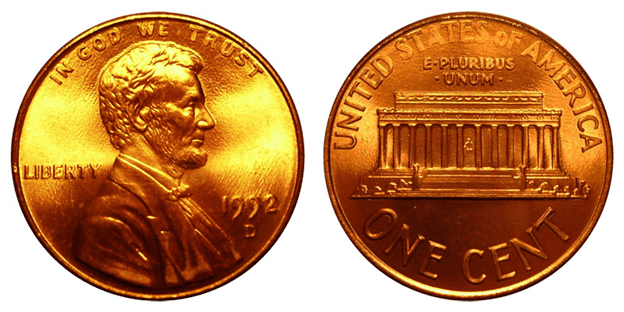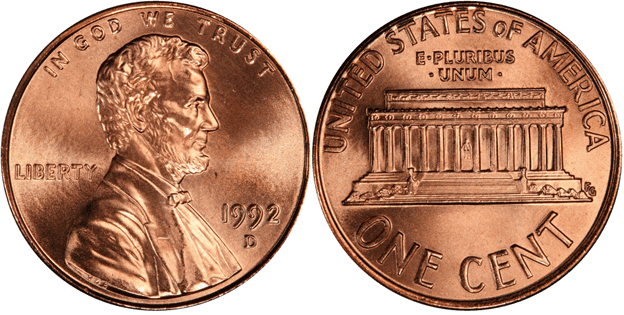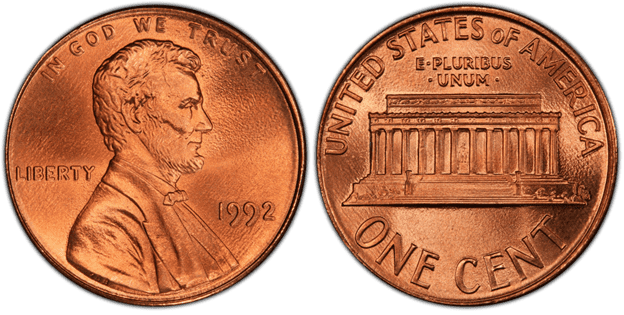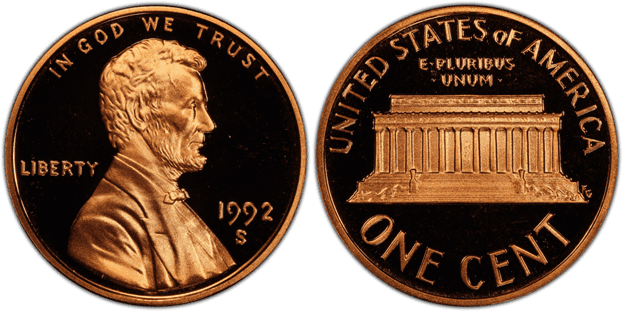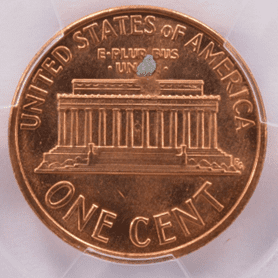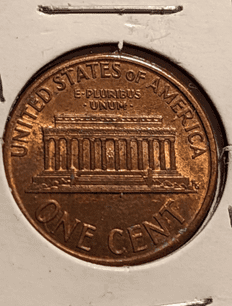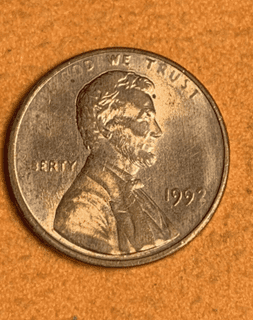What Is the 1992 Lincoln Penny Made Of?
The 1992 Lincoln penny is made of 2.5% copper and 97.5% zinc. Like other US coins, most are now made of base metals. However, the Lincoln penny isn’t always made of copper and zinc. For example, from 1909 to 1942 and from 1944 to 1982, the Lincoln penny was made of 95% copper and 5% tin or zinc.
To give you more idea about the 1992 Lincoln penny, here are some important specifications you should know:
- Mass: 2.5 g
- Diameter: 19.05 mm
- Edge: Plain
- Value: 1 cent
- Years of minting: 1909 up to present
Today, the reverse of the Lincoln penny is designed by Lyndall Bass. It features the Union Shield. However, prior to 2010, the reverse features the Lincoln Monument prepared by Frank Gasparro.
The Lincoln penny has always used the obverse design of Victor David Brenner to this day. It essentially remained the same with just some minor modifications.

photo source: USA Coin Book
The obverse includes the image of Abraham Lincoln, facing right. On top of his head is the inscription IN GOD WE TRUST. On his left is the word “LIBERTY.” In front of him is the year of the series, which is 1991.
The reverse, as mentioned, has the Lincoln Monument. Inscriptions include the following:
- UNITED STATES oF AMERICA
- ONE CENT
- E PLURIBUS UNUM
Abraham Lincoln was the 16th president of the United States. He was chosen to be the face of the penny in 1909, which also coincided with his 100th birth year.
1992 Lincoln Penny Varieties
There are different varieties of the Lincoln penny in 1992. There are minor differences among these varieties. However, the most prominent difference would be their mint mark.
Here are some of the best 1992 Lincoln penny varieties that you might want to know:
1992 D Lincoln Penny
Year of minting: 1992
Mint Mark: D
Place of minting: Denver
Quantity produced: 4,448,673,300
Face Value: $0.01 (one cent)
Price: $0.01 to $1.00 (or more)
Mass: 2.5 grams
Edge: Plain
Designer: Victor D. Brenner (obverse) / Frank Gasparro (reverse)
Composition: 97.5% zinc and 2.5% copper
Diameter: 19.05 mm
Thickness: 1.52 mm

photo source: PCGS
The Denver Mint produced more than 4 billion 1992-D pennies. If you want to buy one of these or you have a penny to sell, you can expect that the value of the coin is around $0.01 to $1.00.
1992 P Lincoln Penny
Year of minting: 1992
Mint Mark: None
Place of minting: Philadelphia
Quantity produced: 4,648,905,000
Face Value: $0.01 (one cent)
Price: $0.01 to $15.00 (or more)
Mass: 2.5 grams
Edge: Plain
Designer: Victor D. Brenner (obverse) / Frank Gasparro (reverse)
Composition: 97.5% zinc and 2.5% copper
Diameter: 19.05 mm
Thickness: 1.52 mm

photo source: PCGS
The Philadelphia Mint produced more than 4.6 billion Lincoln pennies in 1992. For some reason, on average, the 1992-P penny is considered to be more valuable than the other varieties. You can buy or sell this penny for up to $15 or more.
1992 S Lincoln Penny
Year of minting: 1992
Mint Mark: S
Place of minting: San Francisco
Quantity produced: 4,176,560
Face Value: $0.01 (one cent)
Price: $0.01 to $1.00 (or more)
Mass: 2.5 grams
Edge: Plain
Designer: Victor D. Brenner (obverse) / Frank Gasparro (reverse)
Composition: 97.5% zinc and 2.5% copper
Diameter: 19.05 mm
Thickness: 1.52 mm

photo source: PCGS
The San Francisco Mint was able to produce more than 4 million Lincoln pennies in 1992. You might ask, “Why so few?” The answer is that the San Francisco Mint is focused more on producing high-quality proof coins.
They create shinier, more detailed, and more beautiful 1992-S Lincoln pennies. Usually, proof coins are made for collectors and not made for circulation.
List of 1992 Lincoln penny errors
With billions of Lincoln pennies produced in 1992, it’s only a matter of time before a coin would be made with an error. That’s why you will find some Lincoln pennies that are different from other standard-struck coins.
Errors usually happened due to mechanical error or human error. Because of the continuous usage of equipment, some parts may get loose while others wear out. As a result, there will be coins that don’t get the strike they need.
Here are some examples of 1992 Lincoln penny errors:
Struck thru retained debris

photo source: eBay
During the minting process, a foreign material went between the die and the planchet. This material was even retained and as you can see, you’ll find it on the reverse side of the coin.
Doubled die cracks

photo source: eBay
Due to repeated strikes, the die can crack. Its crack would also be seen on the coin. On this coin, you’ll see doubled die cracks on the reverse side.
Weak strike and struck through error

photo source: eBay
There are times when the die didn’t hit the coin as hard as it should have. As a result, the weak strike leaves not-so-detailed engraved elements. Aside from that, this coin was struck through grease, making the strike weaker.
How Much Is the 1992 Lincoln Penny Worth Today?
A regular and ordinary 1992 Lincoln penny isn’t that valuable. Its face value is only $0.01. Its melt value is slightly lower at $0.0076.
Nevertheless, if you have a 1992 penny in great condition or a penny with rare attributes, then you could be looking at a coin with a higher value.
Just to give you an idea, here is a 1992 Lincoln penny value chart that you can use to compare pricing:
| Coin | Condition | Grade | Mintage | Value |
| 1992 D Kennedy | Circulated/mint | Not graded | 4,448,673,300 | $0.01 to $1.00 |
| 1992 D Lincoln penny | Uncirculated/mint | MS-67 | 4,448,673,300 | $14-$25 |
| 1992 D Lincoln penny | Uncirculated/mint | MS-68 | 4,448,673,300 | $16-$35 |
| 1992 D Lincoln penny | Uncirculated/mint | MS-69 | 4,448,673,300 | $2,128 to $5,175 |
| 1992 P Washington Quarter | Circulated/mint | Not graded | 4,648,905,000 | $0.01 to $15.00
|
| 1992 P Washington Quarter | Uncirculated/mint | MS-67 | 4,648,905,000 | $15 to $150 |
| 1992 P Washington Quarter | Uncirculated/mint | MS-68 | 4,648,905,000 | $50 to $168 |
| 1992 P Washington Quarter | Uncirculated/mint | MS-69 | 4,648,905,000 | $1,234 to $2,875 |
| 1992 S Washington Quarter | Circulated/proof | Not graded | 4,176,560 | $0.01 to $1.00 |
| 1992 S Washington Quarter | Uncirculated/proof | PR-68 | 4,176,560 | $9 to $18 |
| 1992 S Washington Quarter | Uncirculated/proof | PR-69 | 4,176,560 | $8 to $15 |
| 1992 S Washington Quarter | Uncirculated/proof | PR-70 | 4,176,560 | $40 to $92 |
Are There Any Rare 1992 Lincoln Pennies?
Yes, there are rare 1992 Lincoln pennies. Among the rarest and perhaps the most expensive ones is the 1992-D Lincoln penny with a close “AM.”
If you look closely, the letters A and M in the word America should have a small gap, not touching each other. However, in this rare coin, there’s an obvious close gap between A and M, making the coin quite unique and rare. The coin was sold for $25,000!
There are also other coins that became rare because of their great condition and preservation. For example, 1992 Lincoln pennies with a grade of MS-69 and PR-70 are quite rare because only a few coins can get a grade like this.
How Does The Grading System Work?
The Sheldon Scale is used by numismatists to provide a numerical value to coins. The Sheldon Scale goes from poor (P-1) to perfect mint state (P-1) (MS-70). Coins were originally evaluated using words to reflect their condition (Good, Fair, Excellent, Etc.). Unfortunately, coin collectors and dealers had different ideas about what each of these terms represent.
Professional numismatists joined together in the 1970s and established CoinGrading standards. These numismatists now assign grades at key places on the seventy-point scale, using the most regularly utilized numeric points in conjunction with the original adjective grade. The following are the most common coin grades:
-
-
- (P-1) Poor – Indistinguishable and probably damaged; if used, must have a date and mintmark; otherwise, rather battered.
- (FR-2) Fair – Nearly smooth, but without the damage that a coin graded Poor often possesses. The coin must have enough detail to be identified.
- (G-4) Fair – Inscriptions have merged into the rims in some areas, and important elements have been mostly erased.
- (VG-8) Very Good- A little weathered, but all of the primary design elements are visible, albeit faintly. There is little if any, central detail left.
- (F-12) Good – The item is very worn, yet the wear is even, and the overall design details stand out clearly. Rims are almost completely isolated from the field.
- (VF-20) Very Fine – Moderately weathered, with some finer features still visible. The motto or all letters of LIBERTY are readable. Both sides of the coin have entire rims that are separated from the field.
- (EF-40) Extremely Fine – Gently used; all gadgets are visible, and the most important ones are bold. The finer details are bold and clear, however, light wear may be seen.
- (AU-50) Uncirculated – Slight evidence of wear on the coin’s design’s high points; may have contact marks; eye appeal should be adequate.
- (AU-58) Uncirculated Choice – Slight traces of wear, no severe contact marks, almost full mint shine, and great eye appeal.
- (MS-60) Mint State Basal – Strictly uncirculated; no indication of wear on the coin’s highest points, but an unsightly coin with reduced luster, visible contact marks, hairlines, and other flaws.
- (MS-63) Mint State Acceptable – Uncirculated, but with contact scratches and nicks, little reduced shine, but otherwise appealing appearance. The strike is weak to average.
- (MS-65) Mint State Choice – Uncirculated with great mint shine, very little contact blemishes, and exceptional eye appeal. The strike is unusually severe.
- (MS-68) Mint State Premium Quality – Uncirculated with superb luster, no obvious contact marks to the naked eye, and exceptional eye appeal. The strike is quick and appealing.
- (MS-69) Almost Perfect Mint State – Uncirculated with perfect brilliance, a sharp and appealing strike, and extremely good eye appeal. A near-perfect coin with minor imperfections in the planchet, strike, and contact markings (seen only under 8x magnification).
- (MS-70) Mint State Perfect – Under 8x magnification, there are no tiny imperfections discernible; the strike is crisp, and the coin is perfectly centered on a beautiful planchet. Rarely seen on a coin, this coin is bright and whole, with original luster and exceptional eye appeal.
-
Where To Buy Or Sell 1992 Lincoln Penny?
You can buy or sell 1992 Lincoln pennies online. Simply browse the Internet and you’ll soon find websites that specialize in coin collection. Aside from that, online marketplaces such as Amazon, eBay, and Facebook Marketplace are your go-to place to buy or sell coins.
Aside from online, you can visit a coin shop, antique shop, and even auction houses. Find people who have the same interest and join their group. By having a larger network, you’ll have a better way of buying and selling 1992 Lincoln pennies.
FAQs
Why is the 1992 penny so valuable?
The 1992 penny is valuable when it is rare or in superb condition. The value astronomically increases when the penny is both rare and in good condition. Moreover, once your coin is graded and certified, it becomes more expensive.
How to identify a 1992 close AM penny?
To identify a 1992 close AM penny, you can look closely at the letters A and M in the word America. If you can’t find a gap, then your coin could be a rare one.
Is the 1992 Lincoln Penny Sell for Over $20000?
Yes, there’s a rare type of 1992 Lincoln penny that was sold for $20,000. This coin has close “AM” letters in the word “America.”
Is a 1992 penny supposed to be wide or close AM?
The 1992 penny should have a wide AM, which refers to the letters in the word “America.” Normally, there’s a slight gap between the letters A and M. However, in a rare coin, you’ll see that the gap is gone and the letters A and M almost touch each other.

